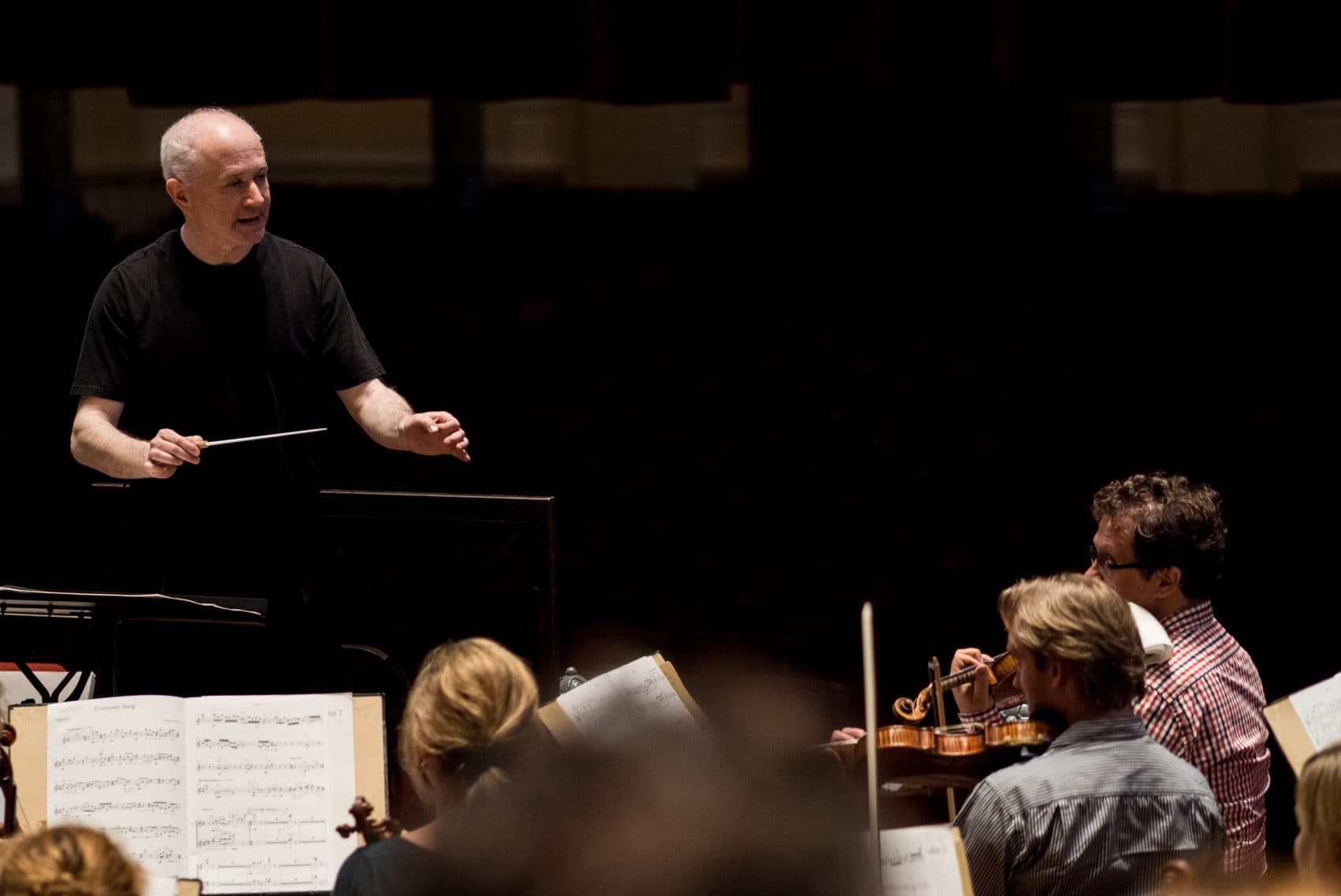Advertisement
The BSO Will Perform George Benjamin's Ravishing New Vocal Piece

For the past couple of decades, two British composers — Thomas Adès and George Benjamin — have been particularly capturing the attention of the Boston Symphony Orchestra.
Adès, at 45, has recently been named the BSO’s “artistic partner” (its version of composer-in-residence). Since 1998, his music has been scheduled on more than a dozen programs in Boston and at Tanglewood, mostly by the BSO itself or the Boston Symphony Chamber Players, and he has appeared as conductor and pianist as well. Beginning in 1996, Benjamin, 57, has had works of his performed on 21 different programs — mostly at Tanglewood, where in the summer of 2000 he directed the annual Festival of Contemporary Music.
The first Benjamin piece I ever heard was in 2000 at Carnegie Hall, conducted by Pierre Boulez with the London Symphony Orchestra as part of a tribute to Boulez on his 75th birthday. Boulez had very good taste in contemporary music. The glittering “Palimpsest” (later the first part of a two-part piece called “Palimpsests I and II”), blew me away with its delicately etched themes in intriguingly contrasting layers (including a mysteriously wire-brushed timpani that seemed to be scraping away the surface of the palimpsest). It was clearly the work of a master. Later that summer, Benjamin conducted it with the Tanglewood fellows, and I applauded it yet again when David Robertson led another brilliant performance with the BSO on Valentine’s Day, 2002. In my review, I wrote that “this compellingly ambiguous piece, brilliantly played, had the audience at the edge of its collective seat.”
Like Adès, Benjamin may be best known as an opera composer. The great Tanglewood event of 2013 was a performance he led with the Tanglewood fellows of his hair-raising opera “Written on Skin,” which some critics and musicians regard as the most important opera of the 21st century.
This season, the BSO has scheduled the local premieres of major vocal works by each of these composers. Last November, we heard Adès conduct his stirring new cantata, "Totentanz," and this week (Feb. 9-11), Andris Nelsons will conduct Benjamin’s "Dream of the Song" (which was performed last summer by the Tanglewood Music Center Orchestra under Stefan Asbury). (Note: Thursday's performance has been postponed due to snow.)
“Dream of the Song” is Benjamin’s first new piece after “Written on Skin,” and like the opera is both ravishingly translucent and visceral, a 20-minute work (in C!) for “reduced” orchestra (just two oboes, two harps, four horns, percussion and strings), countertenor and female chorus. It was co-commissioned by the BSO along with Amsterdam’s Royal Concertgebouw (where the composer conducted its world premiere in 2015), the BBC and the Paris Autumn Festival.
In six short movements, Benjamin sets poems by three poets who lived in Granada: two 11th-century Hebrew poets — Samuel HaNagid and Solomon ibn Gabirol — and Federico García Lorca, the 20th-century Spanish poet murdered at the age of 38 by fascists at the beginning of the Spanish Civil War. All the poems were inspired or influenced by the Arabic “casidas” and “ghazals” that flourished for centuries in Granada.
The subjects of the poems range from writing itself to human suffering to the mystery of the natural world, starlight and sunrise. In the first song, marked “Fast, volatile,” the countertenor sings ibn Gabirol’s "The Pen" (in Peter Cole’s English translation), in which that writing instrument is not only the source of wisdom and prudence but "in ambush kills like an arrow."
Advertisement
Even more haunting is the second song, “The Multiple Troubles of Man,” with its lamenting oboe and the hesitant verbal repetitions Benjamin adds to HaNagid’s poem:
Consider the heart (the heart, the heart)
which holds them (holds them) all
in strangeness, and doesn’t break.
The powerful, almost brutal climactic movement is the setting for women’s chorus of Lorca’s “Ghazal of Marvelous Love”:
Skies and fields
tied chains on my hands.Fields and skies
lash the wounds of my flesh.
In these audio clips, the singer is the superb North Carolinian countertenor Bejun Mehta (a cousin of conductor Zubin Mehta), who sang the world premiere (and also the world premiere of “Written on Skin”) and will be singing the Boston premiere this week.
With the world premiere of the Russian composer Sofia Gubaidulina’s triple concerto for violin, cello and bayan later this month (Feb. 23-25), another BSO commission conducted by Andris Nelsons, the BSO is truly taking seriously its dedication to offering — and creating — world class contemporary music.
This article was originally published on February 07, 2017.



